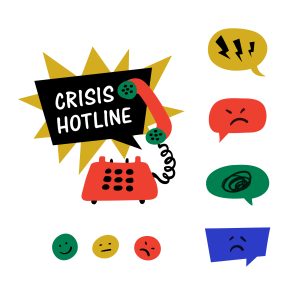By – James M. Katz, BA
 In the face of a crisis, having skilled professionals equipped with the right tools and knowledge can be a lifesaver—literally. This is where the role of a Crisis Intervention Specialist becomes crucial. They are the frontline responders who address mental health crises, employing suicide prevention techniques, providing trauma-informed care, and executing crisis management strategies. Their work is vital in navigating individuals through their darkest moments, ensuring safety and facilitating the path towards healing and stability. Understanding what a Crisis Intervention Specialist does and why their work is so important showcases the critical nature of their role in our communities.
In the face of a crisis, having skilled professionals equipped with the right tools and knowledge can be a lifesaver—literally. This is where the role of a Crisis Intervention Specialist becomes crucial. They are the frontline responders who address mental health crises, employing suicide prevention techniques, providing trauma-informed care, and executing crisis management strategies. Their work is vital in navigating individuals through their darkest moments, ensuring safety and facilitating the path towards healing and stability. Understanding what a Crisis Intervention Specialist does and why their work is so important showcases the critical nature of their role in our communities.
This article will explore the path to becoming a Crisis Intervention Specialist, beginning with the required educational background and moving through the professional certification process. It will delve into the key skills necessary for success in the field, including crisis intervention techniques, intervention strategies, and the ability to define crisis intervention effectively. Additionally, the training path, including crisis intervention training and crisis intervention programs, will be discussed to provide a comprehensive overview of how professionals are prepared for this demanding yet rewarding career. On-the-job training and experience, financial aspects of pursuing this career, and career development and advancement opportunities will further delineate what it takes and what it offers to those who choose this path of service.
A crisis intervention specialist is a mental health professional who helps people during difficult and traumatic times. They provide support, hope, and care to individuals, families, and communities facing serious challenges. These specialists work in various settings, such as schools, hospitals, and community organizations, to offer immediate help and counseling to those in need.
Key Takeaways
- Crisis intervention specialists support people in serious and traumatic situations.
- They work in many places like hospitals, schools, and community centers.
- Key skills include communication, problem-solving, and emotional resilience.
- Educational paths include relevant degrees, certifications, and ongoing training.
- Their work has a big impact on individuals and communities, offering immediate help and building resilience.
What is a Crisis Intervention Specialist?
Definition and Scope
A Crisis Intervention Specialist is a highly trained professional equipped to offer counseling, assessment, and treatment to individuals experiencing a crisis. These specialists, also known as crisis interventionists, are qualified mental health professionals with specialized training to support, provide hope, and deliver healthcare to individuals, families, and communities facing serious and often traumatic circumstances.
Key Responsibilities
The responsibilities of a Crisis Intervention Specialist are diverse and demanding. They assess and treat individuals with mental, emotional, or substance abuse problems, including issues related to alcohol, tobacco, and other drugs. https://www.franklin.edu/career-guide/mental-health-and-substance-abuse-social-workers/what-do-crisis-intervention-specialists-do This role may involve a variety of tasks such as individual and group therapy, crisis intervention, case management, client advocacy, prevention, and education.
Crisis Specialists often operate from private home offices, using telecommuting hardware and software to provide telephonic and text-based emotional support and resources. They are expected to manage documentation, access resources via web-based platforms, and provide strengths-based, unbiased crisis counseling to all individuals who reach out for help. Ensuring the highest standards for the delivery of evidence-based or evidence-informed crisis support, including suicide prevention and intervention, is a critical part of their job.
Additionally, these professionals must maintain professionalism in their workspace and ensure the privacy and confidentiality of each caller’s information. They actively participate in on-the-job professional development opportunities and remain flexible to new job duty assignments. Crisis Intervention Specialists work in various settings including crisis call centers, schools, government-based or military organizations, and mental health facilities such as hospitals and clinics. Some may travel extensively to respond to crises at different locations, while others might work remotely.
Their clinical skills include mental health and substance use counseling, behavioral analysis, rapid assessment, and verbal de-escalation, while crucial soft skills comprise empathy, patience, good communication, and problem-solving abilities.
Conducting Assessments and Evaluations
Crisis intervention specialists are trained to assess and evaluate individuals in distress. They quickly determine the severity of the situation and identify the immediate needs of the person in crisis. This helps in creating an effective plan to address the issue at hand.
Providing Immediate Support and Counseling
These specialists offer immediate support and counseling to those facing traumatic or high-stress situations. They provide a listening ear and practical advice, helping individuals navigate through their crisis moments.
Coordinating with Other Professionals
Crisis intervention specialists often work with other professionals, such as doctors, social workers, and law enforcement officers. This collaboration ensures that the person in crisis receives comprehensive care and support from various angles.
Essential Skills for Crisis Intervention Specialists
Communication and Interpersonal Skills
Crisis intervention specialists must be excellent communicators. They need to listen carefully and speak clearly to help people in tough situations. Good communication helps build trust and understanding. This is important when working with individuals, families, or groups.
Problem-Solving and Critical Thinking
These specialists often face complex problems that need quick solutions. They must think on their feet and come up with effective plans. Being able to solve problems quickly can make a big difference in a crisis.
Emotional Resilience and Self-Care
Working in crisis situations can be very stressful. Specialists need to stay calm and strong, even when things are tough. Taking care of their own mental health is also important so they can keep helping others.
Work Environments for Crisis Intervention Specialists
Hospitals and Mental Health Clinics
 Crisis intervention specialists often work in hospitals and mental health clinics, where they provide immediate support to patients experiencing severe emotional distress. These professionals are crucial in stabilizing individuals and preventing further psychological harm. They collaborate with medical staff to ensure comprehensive care.
Crisis intervention specialists often work in hospitals and mental health clinics, where they provide immediate support to patients experiencing severe emotional distress. These professionals are crucial in stabilizing individuals and preventing further psychological harm. They collaborate with medical staff to ensure comprehensive care.
Schools and Educational Institutions
In schools, crisis intervention specialists help students who are dealing with emotional or behavioral issues. They work closely with teachers and counselors to create a safe and supportive environment. Their role is vital in addressing crises that can impact a student’s ability to learn and thrive.
Community and Government Organizations
Specialists in crisis intervention also find roles in community and government organizations. Here, they assist individuals and families facing various crises, from natural disasters to personal emergencies. Their work helps strengthen community resilience and provides essential support during challenging times.
Required Educational Background
Degrees and Majors
The journey to becoming a Crisis Intervention Specialist begins with obtaining a bachelor’s degree. Prospective students often select majors that include psychology, sociology, gender and women’s studies, education, or social work . While a bachelor’s degree allows one to work in crisis intervention, it restricts direct one-on-one patient interactions. For those aiming to engage in individual intervention counseling, a master’s degree in social work or psychology becomes essential. Further educational advancement can lead to more specialized roles. Some individuals may choose to pursue a Ph.D., which not only enhances professional opportunities but also facilitates careers in academia or as crisis intervention instructors. This level of education involves significant contributions to the field, such as publishing in peer-reviewed journals.
Continuing Education
Continuing education plays a pivotal role in the career of a Crisis Intervention Specialist. Certifications, often pursued through reputable organizations like the American Institute of Health Care Professionals, are crucial for professional development. These certifications may cover various areas including intervention theory, treatment planning, nonviolent crisis intervention, and more.
The American Institute of Health Care Professionals, for instance, offers a comprehensive Continuing Education program that leads to Certification in Crisis Intervention Consulting. This program consists of seven courses, each provided in a dedicated online classroom with one-to-one faculty mentoring. The certification process underscores the importance of staying updated with the latest developments in healthcare, which is crucial for delivering effective patient care.
Moreover, some certifications, like the CIC-Cusp, require a minimum of 50 hours of continuing education within a four-year period to maintain the certification status. This ongoing learning is essential not only for personal growth but also for adhering to the evolving standards of crisis intervention practice.
Professional Certification Process
Types of Certifications
To become a recognized Crisis Intervention Specialist, individuals must obtain certification from a reputable professional organization. This certification is an official acknowledgment that the individual has met all the established standards set by the organization. Unlike licensure, which is government-regulated, certification is granted by professional bodies and does not adhere to any laws. For instance, the Crisis Specialist Certification is awarded after participants successfully pass a certification exam, which requires a minimum score of 80%. Candidates are allowed two attempts to pass this exam, and failing to do so necessitates retaking the course.
The American Institute of Health Care Professionals offers a model where certification is based on a core curriculum of Continuing Education (CE) Courses. This ensures that all certified members possess up-to-date knowledge and skills pertinent to their specialty. Certification in various areas such as intervention theory, treatment planning, nonviolent crisis intervention, and more, demonstrates an applicant’s expertise beyond a general degree and is highly valued in professional settings.
Maintaining Certification
Maintaining certification is crucial for a Crisis Intervention Specialist to ensure they remain competent and effective in their role. Certified professionals are required to undergo recertification every few years. This process involves completing additional training and passing the exam anew to stay aligned with the latest research and best practices. Continual learning and adherence to evolving standards are emphasized through required continuing education credits. These credits must be accumulated as per the certifying body’s standards to maintain certification status. Continuing education serves multiple purposes; it keeps professionals abreast of the latest developments in their field, maintains their skills, meets licensure requirements where applicable, and ultimately enhances patient care. The commitment to ongoing education reflects a professional’s dedication to their craft and their ability to provide the highest standard of care. In conclusion, the certification process for Crisis Intervention Specialists not only validates professional competence but also ensures continual growth and adherence to the highest standards of practice.
Key Skills for Success
Interpersonal Skills
Interpersonal skills are crucial for a Crisis Intervention Specialist, as they often act as the first point of contact in crisis situations. Effective communication is essential, not just in conveying information but also in de-escalating potential crises. Specialists need to be articulate and confident, capable of handling high-stress situations with clarity and composure. They should also be adept at building relationships and fostering trust quickly, which can be pivotal in crisis resolution. Demonstrating empathy and maintaining professionalism are key, as these traits help create a safe space for individuals in distress, allowing them to feel understood and supported.
Problem-Solving Abilities
Crisis Intervention Specialists must excel in problem-solving, particularly under pressure. The ability to analyze situations quickly, identify key issues, and implement effective solutions is fundamental. This requires not only a thorough understanding of crisis intervention techniques but also the ability to think critically and make decisions swiftly. The nature of crises means that no two situations are the same, thus flexibility and adaptability are essential. Specialists must be prepared to alter their strategies as situations evolve, ensuring that their interventions are responsive and effective.
Stress Management
Managing personal stress is equally important for Crisis Intervention Specialists. The role involves frequent exposure to highly stressful and emotionally charged situations, which can take a toll on one’s mental and physical health. Effective stress management strategies are necessary to maintain personal well-being and professional effectiveness. This includes recognizing the signs of stress, employing techniques such as deep breathing or mindfulness, and ensuring adequate rest and recovery. Specialists must also be adept at managing organizational stress, anticipating potential crisis impacts, and preparing accordingly to mitigate adverse effects on the organization and its members.
By mastering these key skills, Crisis Intervention, Specialists can provide essential support and guidance, helping individuals navigate through their most challenging moments while also maintaining their own health and resilience.
Challenges Faced by Crisis Intervention Specialists
High-Stress Situations
Crisis intervention specialists often find themselves in the middle of very stressful situations. They need to stay calm and think clearly, even when things are chaotic. Handling these high-pressure moments is a big part of their job.
Emotional and Psychological Impact
Working with people in crisis can take a toll on a specialist’s own emotions and mental health. They might feel sad or stressed after helping someone through a tough time. It’s important for them to find ways to cope with these feelings.
Managing Work-Life Balance
Balancing work and personal life can be hard for crisis intervention specialists. Their job can be demanding, with long hours and unexpected calls for help. Finding time to relax and spend with family is crucial to avoid burnout.
Impact of Crisis Intervention Specialists on Communities
Supporting Individuals in Crisis
Crisis intervention specialists play a crucial role in helping people during their most difficult times. They offer immediate support and guidance, helping individuals navigate through their crises. Their presence can make a significant difference in the lives of those struggling with mental, emotional, or substance abuse issues. By providing timely assistance, they help prevent situations from escalating further.
Strengthening Community Resilience
These specialists not only support individuals but also contribute to the overall resilience of the community. They work to build stronger support networks and educate the public on how to handle crises. This proactive approach helps communities become better prepared to face future challenges, fostering a sense of unity and strength.
Collaborating with Local Resources
Crisis intervention specialists often collaborate with local resources such as schools, hospitals, and community organizations. This teamwork ensures that individuals in crisis receive comprehensive care and support. By working together, they can address the various needs of those affected and provide a more holistic approach to crisis management.
Financial Aspects of the Career
Salaries and Benefits
The financial rewards of a career as a Crisis Intervention Specialist can vary widely based on several factors including the individual’s level of education, certifications, and specific job role within the field. Typically, entry-level positions may offer a starting salary range from $30,000 to $40,000 annually. However, those with advanced degrees and specialized certifications can expect significantly higher compensation, potentially exceeding $70,000 per year. In addition to salary, benefits play a crucial role in the overall compensation package for Crisis Intervention Specialists. Common benefits include health insurance, paid leave, and retirement plans. Some employers also offer tuition reimbursement programs, which are particularly beneficial for those pursuing ongoing education or additional certifications. These benefits not only provide financial security but also support the specialist’s career development and personal well-being.
Geographical Differences
Salaries and employment opportunities for Crisis Intervention Specialists can also be influenced by geographical location. Urban areas typically offer higher salaries compared to rural settings due to the higher cost of living and the greater demand for mental health services in densely populated regions. For instance, specialists working in cities such as New York or San Francisco may earn more than their counterparts in smaller towns or rural areas.
Moreover, some states and regions may have higher concentrations of employment opportunities in this field, often correlated with larger populations and more extensive healthcare systems. This geographic variability means that those willing to relocate may find more lucrative or plentiful job opportunities, which can significantly impact career trajectory and earnings potential.
By understanding these financial aspects, individuals interested in becoming Crisis Intervention Specialists can better plan their career paths and financial goals, ensuring they are adequately prepared for the varied opportunities and challenges in this field.
Career Development and Advancement Opportunities
Advanced Roles
Pursuing advanced degrees such as a master’s in counseling or psychology can significantly broaden a specialist’s scope of practice, enabling them to handle more complex cases and work in diverse settings. Specialists with a master’s degree are equipped to engage more directly with patients and are often preferred for positions that require individual patient interactions.
Moreover, obtaining a Ph.D. can propel a Crisis Intervention Specialist into higher echelons of their career, such as academic positions or roles as crisis intervention instructors. This level of education demands significant contributions to the field, including publishing in peer-reviewed journals and mastering the discipline’s fundamental principles. Such advanced roles not only enhance professional growth but also expand the range of career opportunities available in both public and private sectors, as well as in nonprofit organizations. Through these structured educational and certification paths, Crisis Intervention Specialists are well-prepared to advance in their careers, continually enhancing their ability to provide effective support and intervention during crises.
Career Advancement Opportunities for Crisis Intervention Specialists
Leadership and Supervisory Roles
Crisis intervention specialists can move up to leadership positions where they manage teams and oversee programs. These roles often involve guiding less experienced staff and ensuring the quality of services provided. This step up not only brings more responsibility but also the chance to shape the direction of crisis intervention efforts.
Specialization in Specific Populations
Some specialists choose to focus on working with particular groups, such as children, veterans, or individuals with substance abuse issues. Specializing allows them to develop deeper expertise and provide more targeted support. This path can lead to becoming a recognized expert in that area, opening doors to new opportunities.
Engagement in Research and Policy Development
Another avenue for career growth is getting involved in research and policy-making. By contributing to studies and helping to shape policies, crisis intervention specialists can influence the broader field. This work not only advances their careers but also helps improve practices and outcomes for those in crisis.
Conclusion
Through an in-depth examination of the journey to becoming a Crisis Intervention Specialist, this article has elucidated the pivotal roles these professionals play in offering support during crises. Emphasizing the critical skills, requisite educational background, and the importance of continuous professional development and certification, it is clear that becoming a Crisis Intervention Specialist requires dedication, compassion, and a high degree of specialized training. Notably, the article showcased how these specialists not only provide invaluable support to individuals in dire need but also contribute significantly to the broader framework of mental health services.
The significance of ongoing education and the pursuit of advanced certifications underscore a commitment to excellence and an understanding of the evolving nature of crisis intervention. This field, which demands both personal resilience and deep empathy, offers professionals a unique opportunity to make a profound impact on lives during moments of vulnerability. As the landscape of mental health and crisis intervention continues to evolve, the dedication of those who choose this path remains an essential beacon of hope for individuals and communities navigating the complexities of crises.
If you’re a mental healthcare professional and want to become a Crisis Intervention Specialist then please review our Crisis Intervention Counseling Certification Program. Our program requires a student to complete 7 online Crisis Intervention Courses in order to qualify for certification. For more details, please visit our Online Crisis Intervention Counseling Certification program.
FAQs
- What are the fundamental principles guiding crisis intervention?
The four core principles of crisis intervention include: (1) immediate intervention to stabilize the affected individual or community post-event; (2) helping the victim understand the events that occurred; (3) assisting in problem-solving within feasible limits; and (4) promoting self-reliance to aid in recovery. - What roles do crisis intervention specialists play?
Crisis intervention specialists engage in various roles, such as: providing affective interventions to help clients express their emotions related to the crisis; offering cognitive interventions to eliminate negative beliefs contributing to the crisis; assigning behavioral tasks, like encouraging social interactions; and more. - What qualities make an effective crisis worker?
Effective crisis workers possess several key characteristics, including the ability to empathize with clients while maintaining professional detachment, a nonjudgmental attitude, a nonreactive demeanor, a high tolerance for stressful situations, and specialized training in crisis intervention. - What responsibilities does a crisis intervention specialist have?
A Crisis Intervention Specialist is responsible for assessing and treating individuals with mental, emotional, or substance abuse issues. This can include managing alcohol, tobacco, or drug abuse problems through individual and group therapy, crisis management, case management, client advocacy, and providing educational and preventive measures. - What is a crisis intervention specialist?
A crisis intervention specialist is a trained professional who helps people in serious and often traumatic situations. They provide support, hope, and healthcare to individuals, families, and communities. - Where do crisis intervention specialists work?
Crisis intervention specialists can work in many places, like hospitals, mental health clinics, schools, community organizations, and crisis call centers. - What skills are important for a crisis intervention specialist?
Important skills include good communication, problem-solving, critical thinking, emotional strength, and self-care. - What education is needed to become a crisis intervention specialist?
You usually need a relevant degree, like in psychology or social work, and specialized training. Continuing education is also important to keep up with new methods. - How do crisis intervention specialists help communities?
They support people in crisis, help make communities stronger, and work with local resources to provide better care.
Research Articles:
Fortifying the Foundations: A Comprehensive Approach to Enhancing Mental Health Support in Educational Policies Amidst Crises. Wiedermann CJ, Et Al. Healthcare. 2023; 11(10):1423.
Access link here
Police, ambulance and psychiatric co-response versus usual care for mental health and suicide emergency callouts: A quasi-experimental study. Every-Palmer S, Et Al. Australian & New Zealand Journal of Psychiatry. 2023;57(4):572-582.
Access link here
The Missing Piece: A Population Health Perspective to Address the U.S. Mental Health Crisis. Laura Sampson, Et Al. Daedalus 2023; 152 (4): 24–44.
Access link here
Students’ Perceptions of Crisis Intervention: Using a Trauma Informed Approach Versus Restraint. Mary Triana, Millcreek Township School District Eric Bieniek, Slippery Rock University of Pennsylvania. 35TH ANNUAL NYAR CONFERENCE (MARCH 3-6, 2024)
Access link here




